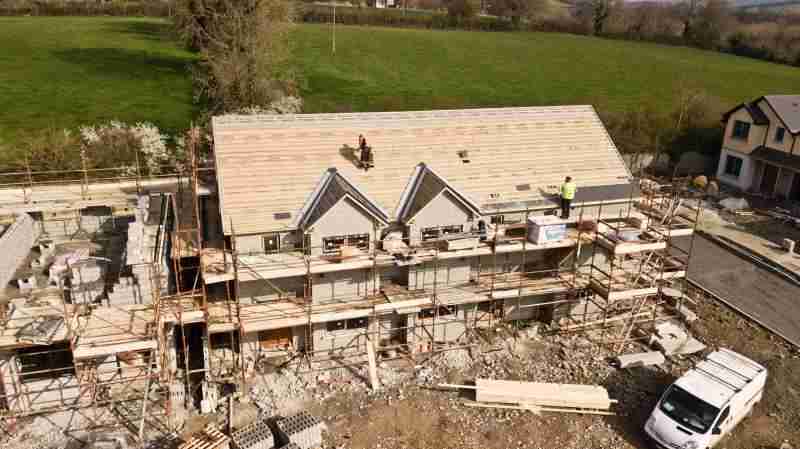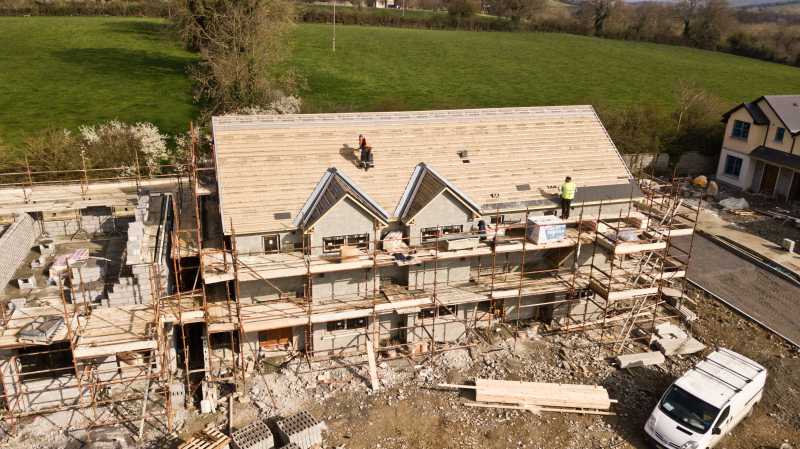Understanding the importance of roofing in sound insulation is crucial for both residential and commercial property owners. At Roof Repairs Services, we specialize in providing top-notch roofing solutions that not only protect your property from the elements but also significantly reduce noise pollution. Our expert team is well-versed in the latest roofing technologies and materials that contribute to sound insulation, enhancing the comfort and tranquility of your living or working environment. Whether you’re dealing with the noise of heavy rain, bustling city sounds, or simply want to create a quieter, more peaceful space, our roofing solutions can make a significant difference. With our commitment to quality and customer satisfaction, we aim to educate our clients about the role of roofing in sound insulation, helping them make informed decisions for their properties.
Understanding the Basics of Sound Insulation

Sound insulation plays a vital role in creating a comfortable and quiet environment within a building. It is a method used to reduce the transmission of noise by providing a barrier between the source of the sound and the recipient. The importance of roofing in sound insulation cannot be overstated. The roof acts as a primary barrier against external noise, such as traffic, wind, and rain.
There are several materials used in roofing that contribute to sound insulation. For instance, asphalt shingles are known for their sound-absorbing properties. Similarly, cement tiles and clay tiles are also effective in reducing noise transmission.
- The choice of roofing material is critical in determining the level of sound insulation.
- Proper installation of the roofing material is also crucial.
- Regular maintenance and replacement of the roof can enhance its sound insulation properties.
It’s important to note that sound insulation is not just about the material but also about the design and installation. For instance, residential roofing and commercial roofing require different approaches to sound insulation due to the varying needs and structures of the buildings.
"The roof is not just a cover for the building, but also a significant component in sound insulation."
For more information on roofing and sound insulation, you can contact us or visit our blog for more insights.
The Role of Roofing in Noise Reduction
Roofing plays a crucial role in sound insulation, significantly reducing noise pollution and enhancing the comfort of your home or office. A well-constructed roof can effectively block external noise, such as traffic, construction, and neighborhood sounds, providing a quieter and more serene environment.
Different types of roofing materials offer varying levels of sound insulation. For instance, asphalt shingle roofing is known for its excellent sound-absorbing properties, while cement tile roofing provides superior noise reduction due to its dense material.
The installation process also significantly impacts the roof’s noise reduction capabilities. Professional residential roofing installation and commercial roofing installation ensure that the roofing materials are correctly installed, maximizing their sound insulation properties.
Roofing maintenance is equally important in maintaining its noise reduction properties. Regular inspections and timely roof replacement can prevent deterioration of the roofing materials, ensuring optimal sound insulation.
In conclusion, the role of roofing in noise reduction is significant. It not only contributes to a peaceful environment but also enhances the overall living or working experience. For more information or assistance with your roofing needs, feel free to contact us.
Materials Used in Roofing for Optimal Sound Insulation

Sound insulation is a crucial aspect of roofing, as it significantly contributes to the overall comfort and tranquility of a home or building. Various materials can be used in roofing to achieve optimal sound insulation, each with its unique properties and benefits.
One of the most commonly used materials is asphalt shingles. Known for their durability and affordability, asphalt shingles also provide excellent sound insulation, making them a popular choice for residential and commercial buildings alike.
Another material that offers superior sound insulation is cement tiles. Cement tile roofing is not only aesthetically pleasing but also highly effective in reducing noise transmission due to its density and thickness.
For flat roofs, specific materials like EPDM (ethylene propylene diene monomer) and TPO (thermoplastic olefin) are often used. These materials are known for their sound insulating properties and are commonly used in flat roofing services.
In addition to the materials used, the installation process also plays a vital role in sound insulation. Both residential and commercial roofing installations require careful planning and execution to ensure optimal sound insulation.
In conclusion, the choice of roofing material significantly impacts the level of sound insulation. Therefore, it is essential to consider the specific needs and requirements of the building before making a decision.
The Science Behind Soundproof Roofing

Soundproof roofing is a crucial aspect of sound insulation, which plays a significant role in maintaining a peaceful and quiet environment within a building. The science behind soundproof roofing involves the use of specific materials and technologies that can effectively block or absorb sound waves, thereby reducing noise transmission.
One of the key elements in soundproof roofing is the material used. Materials such as asphalt shingles and cement tiles are known for their sound-absorbing properties. These materials are dense and thick, which helps in preventing sound waves from penetrating through the roof.
Another crucial factor in soundproof roofing is the installation process. Proper installation is essential to ensure that the roofing materials are effectively blocking noise. This involves the use of specialized techniques and equipment, which can be provided by professional residential roofing installation services.
Moreover, the design of the roof also plays a role in sound insulation. Roofs with multiple layers or those that incorporate sound-absorbing materials in their design can provide better sound insulation.
In addition to these, advancements in technology have led to the development of innovative soundproofing solutions. These include the use of acoustic barriers and sound-absorbing panels, which can significantly enhance the soundproofing capabilities of a roof.
In conclusion, soundproof roofing is a complex process that involves the use of specific materials, proper installation, and innovative design. By understanding the science behind it, homeowners and builders can make informed decisions and ensure optimal sound insulation for their buildings.
Benefits of Sound Insulation in Residential and Commercial Buildings
Sound insulation in both residential and commercial buildings plays a crucial role in enhancing the comfort and productivity of the occupants. One of the most effective ways to achieve this is through the strategic use of roofing. The right roofing materials and installation techniques can significantly reduce noise pollution, contributing to a more serene and peaceful environment.
For instance, flat roofing is known for its excellent sound insulation properties. It can effectively block out external noise, such as traffic and construction sounds, making it ideal for both homes and businesses located in busy urban areas. Similarly, cement tile roofing is another great option for sound insulation. Its dense material can absorb and block out noise, providing a quiet and tranquil indoor environment.
Moreover, sound insulation can also lead to energy savings. By reducing the amount of heat that escapes through the roof, it can help maintain a consistent indoor temperature, reducing the need for heating or cooling. This can result in significant savings on energy bills, especially in commercial buildings where energy consumption is typically high.
In addition to these benefits, sound insulation can also enhance the value of a property. A well-insulated building is more appealing to potential buyers or tenants, as it promises a more comfortable and quiet living or working space. Therefore, investing in sound insulation through proper roofing is not only beneficial for the current occupants but can also be a smart long-term investment.
How to Choose the Right Roofing for Sound Insulation
Choosing the right roofing material is crucial for effective sound insulation. The roofing material you select can significantly impact the level of noise that penetrates your home or office. There are several factors to consider when selecting a roofing material for sound insulation.
Firstly, the density of the material plays a significant role in sound absorption. Denser materials like cement tiles and asphalt shingles are excellent choices for sound insulation as they absorb more sound waves, reducing noise penetration.
Secondly, consider the thickness of the material. Thicker materials tend to provide better sound insulation. For instance, a thick layer of asphalt shingles can provide superior sound insulation compared to a thin layer.
Thirdly, the installation process is also crucial. Proper installation can enhance the sound insulation properties of the roofing material. Therefore, it is advisable to hire professional services like residential roofing installation or commercial roofing installation to ensure the roofing is installed correctly.
Lastly, consider the type of noise you want to insulate. For instance, if you live in a noisy neighborhood, you might need a different roofing material compared to someone living in a quiet rural area.
In conclusion, choosing the right roofing for sound insulation involves considering the material’s density, thickness, installation process, and the type of noise you want to insulate. By considering these factors, you can select the most suitable roofing material for your sound insulation needs.
Maintenance Tips for Your Sound Insulating Roof
Maintaining the integrity of your sound insulating roof is crucial to ensure its longevity and effectiveness. Regular maintenance can help you avoid costly repairs and replacements, while also ensuring that your home or office remains a quiet and peaceful environment.
Firstly, it’s important to regularly inspect your roof for any signs of damage. This includes checking for any loose, missing, or damaged tiles. If you notice any issues, it’s recommended to contact a professional roofing service to assess and fix the problem.
Next, cleaning your roof is another essential step in its maintenance. Over time, debris such as leaves, twigs, and dirt can accumulate on your roof, potentially damaging the sound insulating materials. Regular cleaning can help prevent this.
In addition, it’s important to ensure that your roof is properly ventilated. This helps to prevent moisture buildup, which can lead to mold and mildew growth, damaging your roof and reducing its sound insulating properties.
Lastly, if your roof is old or severely damaged, it may be time to consider a roof replacement. While this can be a significant investment, it can greatly improve the sound insulation of your home or office.
Remember, maintaining your sound insulating roof is not just about preserving its physical condition, but also about ensuring its ability to effectively block out unwanted noise. For more information on roof maintenance and sound insulation, visit our blog.
In conclusion, the role of roofing in sound insulation is undeniably significant. It not only provides a barrier against external noise but also contributes to the overall comfort and tranquility of our living or working spaces. By investing in high-quality roofing materials and incorporating soundproofing technologies, we can significantly enhance the acoustic environment of our buildings. Therefore, it’s crucial to consider roofing as a key element in sound insulation during the construction or renovation process. Remember, a well-insulated roof is not just about protection from the elements, but also about ensuring a peaceful and quiet space inside.

